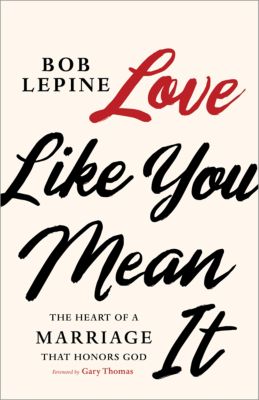We’ve been sold a bill of goods about what love is. Like products advertised on late night television that look amazing but never revolutionize our lives the way they promise, we are duped into thinking that when we exchange vows to love one another until death parts us, we’re signing up to receive a lifetime supply of passion and affirmation and attention and care.
In fact, if we’re really honest, most of us got married because of how our spouse made us feel when we were together. We liked the feeling. So we said “I’ll move in and wear a ring and share a house payment and have kids with you—as long as you keep making me feel that way.”
Deep down, we don’t get married so that we can love someone else. We get married because we fall in love with the feeling of being loved. Most of us get married to get, not to give.
Real Love
Meanwhile, we have right in front of us the whole time the portrait of the kind of rugged, committed love that may not sell a lot of movie tickets or romance novels, but that sustains marriages in good times and bad. Some of us even had the description of this kind of rugged love read at our weddings. With friends and family assembled, someone opened a Bible to 1 Corinthians 13 and started to read what sounded at the time like love poetry. They read about the tongues of angels and noisy gongs. They read about bearing all things, believing all things, hoping all things and enduring all things. In the midst of our big day, it all sounded wonderful and magical.
But if we had been listening carefully to what they were reading, we would have heard a description of a kind of love and loyalty that, as songwriter Rich Mullins said, goes deeper than mere sentiment. A kind of steadfast, enduring love that is the most commonly mentioned attribute of God in all of Scripture. A kind of self-sacrificing, self-denying love that Jesus defined as the “greater love” (John 15:13) and that He demonstrated for us by dying in our place (Romans 5:8).
I like romance and passion as much as the next person. They are the seasoning that makes a marriage relationship vibrant. There is a reason people talk about “spicing up” a marriage. Romance and passion add a zest and joy that bring delight and desire to marriage.
But the foundation for a marriage that endures is not passion and desire. It’s love. Real love. The kind of love that the Apostle Paul described for everyone who was part of the church that gathered in the ancient city of Corinth. These were passionate, impulsive new believers whose pagan background was mixed together with a newfound zeal for God. The outcome of that zeal without knowledge was problematic.
So Paul wrote this young church to teach them about a kind of love they didn’t understand. A kind of love that was just as unknown in their day as it is in ours.
While the Bible’s description of love in 1 Corinthians 13 did not have the husband/wife relationship as its focus, this portrait of genuine love perfectly describes and defines the kind of love that God has in mind for every married couple.
I hope to get us back on track when it comes to understanding what real love is and how we live it out in marriage. There are no quick fixes and superficial adjustments you can make that will cause love to flourish in your marriage. What we see in Scripture is that the kind of deep love for which our souls long does not come through tweaking. It’s a long, slow, rigorous process.
The pathway to joy
But what the Bible promises us is this: the kind of greater love found here is the pathway to joy. It’s the real thing. It’s the kind of love that will bring real, deep down, soul level contentment. The imitation love that the world is peddling will never get you there. It will spring up and fade quickly. Real love takes time. It takes work. There are no shortcuts. But in the end, it’s the only love that satisfies.
My hope is that studying Paul’s definition of love in 1 Corinthians 13 can help us learn to love our spouses in a way that goes further and deeper than momentary sparks of passion or romance.
And my hope is that as you take time to ponder and consider the characteristics of the bold, rugged, genuine love described in 1 Corinthians 13, you’ll think on these things with a soft, humble, teachable heart, and you’ll read it with the prayer from Psalm 139:
Search me, O God, and know my heart!
Try me and know my thoughts!
And see if there be any grievous way in me,
and lead me in the way everlasting! (Psalm 139:23–24)
My hope is that the elements of genuine love found in 1 Corinthians 13 would increasingly become the elements of genuine love that you aspire to as you get married or that you manifest in your marriage now. I hope you’re ready to go on a journey that’s designed to help you become a more loving spouse—a journey that will, in the process, strengthen and deepen your love for your mate and revolutionize your marriage.
It’s time to understand what real love looks like.
This post is an excerpt from Bob Lepine’s new book, Love Like You Mean It.


